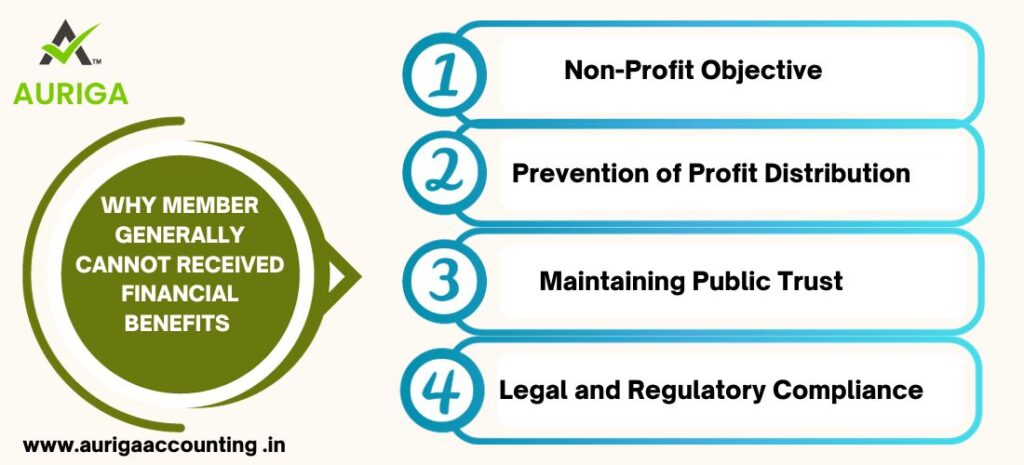
CAN THE MEMBER OF SECTION 8 COMPANY RECEIVED ANY FINANCIAL BENEFITS?
Introduction
ToggleCAN THE MEMBER OF SECTION 8 COMPANY RECEIVED ANY FINANCIAL BENEFITS?
Members of a Section 8 company in India typically cannot receive any financial benefits, such as dividends or profits, from the company’s operations. The primary purpose of Section 8 companies is to promote charitable, non-profit, and public welfare activities. As a result, the regulations governing Section 8 companies place significant restrictions on the distribution of financial benefits to their members.
In this comprehensive explanation, I will elaborate on why members of Section 8 companies are usually not entitled to financial benefits, the legal framework governing such companies, exceptions to this rule, and the broader implications for non-profit organizations in India. Visitofficialwebsite
THE NATURE AND PURPOSE OF SECTION 8 COMPANY
Section 8 companies, previously known as Section 25 companies under the Companies Act, 1956, are governed by the Companies Act, 2013, and are established with the primary objective of promoting charitable, non-profit, and public welfare activities. These organizations are typically formed to advance causes such as education, art, science, sports, research, social welfare, and more, and they are granted certain privileges and exemptions under the law to support these objectives.
THE KEY FEATURES OF SECTION 8 COMPAY
Non-Profit Orientation: The core characteristic of Section 8 companies is their non-profit orientation. They are explicitly prohibited from operating for the purpose of making profits.
Prohibition on Dividends: One of the most important provisions governing Section 8 companies is the prohibition on distributing any dividends or profits to their members. The income generated from the activities of the company is meant to be reinvested in furthering its charitable objects.
Limited Liability: Members of Section 8 companies have limited liability, similar to members of other types of companies. Their personal assets are generally protected and not at risk in the event of the company’s debts or legal liabilities.
Ownership and Control: Members do not have ownership interests in the company’s assets or income. Their role is primarily that of governance and support in advancing the company’s charitable objectives.
Charitable Objects: The objectives and activities of Section 8 companies are specified in their Memorandum of Association (MOA). These objects must be for the benefit of the public and fall within the realm of charity.
Compliance and Oversight: Section 8 companies are subject to regulatory oversight by government authorities, including the Ministry of Corporate Affairs (MCA). They are required to adhere to reporting and compliance requirements, and any misuse of funds for the benefit of members can result in legal action.
Tax Benefits: Section 8 companies may be eligible for certain tax benefits and exemptions, provided they meet the criteria set by the government. These benefits are designed to encourage and support their non-profit and charitable activities.
What is the registration procedure of a Section 8 Company in India
Step 1 – Obtain a DSC of the proposed Directors of the Section 8 Company. Once a DSC is received, file Form DIR-3 with the ROC for getting a DIN. The Proof of Identity and Address Proof needs to be attached for obtaining DSC.
Step 2 – Once the DIR-3 is approved, the ROC will allot a DIN to the proposed directors.
Step 3 – File Form INC-12 with the ROC to apply for a licence for the Section 8 company along with the attachment of the required documents as mentioned above.
Step 4 – Once the form is approved, a license under section 8 will be issued in Form INC-16.
Step 5 – After obtaining the license, file the SPICe+ Form with the ROC for incorporation along with the required attachments as mentioned above.
WHY MEMBER GENERALLY CANNOT RECEIVED FINANCIAL BENEFITS

The core principle governing Section 8 companies is their non-profit and charitable nature. As such, members of these companies are typically not entitled to financial benefits. The reasons behind this restriction are as follows:
Non-Profit Objective: The primary purpose of Section 8 companies is to advance charitable and public welfare activities. Any income or surplus generated from their operations is meant to be reinvested in achieving these objectives. All financial resources should be dedicated to furthering the company’s mission rather than benefiting the members personally.
Prevention of Profit Distribution: Section 8 companies are prohibited from distributing dividends or profits to their members. This is a crucial requirement to ensure that the company’s activities remain aligned with their non-profit and charitable objectives.
Maintaining Public Trust: The restrictions on financial benefits to members are in place to maintain public trust in these organizations. Donors, beneficiaries, and the public at large expect that the resources they contribute or benefit from will be used for charitable purposes, not personal gain.
Legal and Regulatory Compliance: Violating the prohibition on financial benefits to members can result in legal consequences and the potential loss of the company’s non-profit status. Compliance with these regulations is essential to maintain the legal standing of the Section 8 company.
What is the Section 8 company registration
A group or company is referred to as Section 8 Company when it is registered as a Non-Profit organization (NPO) i.e. while it has the motive of promoting arts, commerce, education, charity, defense of the environment, sports, science, research, collective welfare, faith and intends to service its profits (if any) or other earnings for promoting these objectives.
NPOs are not allowed to pay dividends to the company’s members and have to be for the promotion of charitable objectives. Such companies achieve an assimilation certificate from the chief administrative and are apt to adhere to the policy one by the government.
Features Of A Section 8 Company
There are various features of Section 8 Company. Let’s have a look at them:
- Charitable objectives: Section 8 companies can not carry out the business with an ambition to make profits. Their objectives are wholly charitable in nature. The ambition to auxiliary causes like science, culture, research, sports, religion, etc.
- No lowest segment capital: Section 8 companies, just like every other company, make sure of not having a prescribed least amount paid-up capital.
- Limited liability: Members of these companies bottle no more than arranged partial liability.
- Government license: Such companies are able to run merely if they maintain the pivotal Government’s license. The management preserves annul this right as well.
- Privileges: Since these companies possess charitable objectives, the Companies perform have accorded a number of payback and exemptions to them.
Can Section 8 companies receive grants
Eligible for grants and donations –Section 8 companies are eligible for many grants provided by the Government of India and can receive many donations from the general public. Members have limited liability –The personal assets of the members are not used to pay a debt of the company
Can Section 8 company pay salary to director
Generally, Section 8 companies are expected to reinvest their profits back into the organization to further their charitable objectives. However, the Act does allow for the payment of reasonable remuneration to directors or officers for their services.
What is the minimum number of members in a Section 8 company
What are the requirements and compliances for Section 8 company registration? Requirements and Compliance for Section 8 Company Registration in India: Minimum Requirement: A Section 8 Company must be incorporated with a minimum of two directors and two members.
Can company director take salary
Broadly yes. But following factors are important.
- Executive vs. Non-Executive: Director should be preferably assigned as Managing Director, Whole Time Director or at least an executive Director to take salary. In our opinion, non-executive directors cannot take Salary. They may take Board sitting fees and other permissible forms of remuneration.
- Public vs Pvt Company: Director of a private Company can take salaries without any restrictions under Companies Act. However, Directors of a public Company have to follow Managerial Remuneration restrictions under Companies Act.
- Compliance and Disclosure norms: Paying director to a salary is a related party transaction. Hence all compliance related issues like Resolutions and disclosures in Registers and Financial statements need to be complied with.
Following answers are related and can be helpful:
EXCEPTION AND PRACTICAL CONSIDERATION
While the general rule is that members of Section 8 companies cannot receive financial benefits, there are exceptions and practical considerations to be aware of:
Honorarium or Reimbursement: Members can be reimbursed for expenses incurred in furtherance of the company’s objectives, provided this is outlined in the company’s rules and regulations. They may also receive a reasonable honorarium for specific services, subject to the company’s governing documents and applicable laws.
Professional Services: If a member provides professional services to the company, they may be compensated for their services as long as it is reasonable and in line with the company’s charitable objectives.
Employees and Staff: Section 8 companies may employ staff and pay them salaries or wages in accordance with applicable labor laws. However, members serving as employees are not typically entitled to share in the profits of the company.
Reinvestment in Charitable Activities: While members cannot receive financial benefits, the income generated by the Section 8 company can be used to fund and expand the charitable activities that serve the public good.
CONCLUSION OF SECTION 8 COMPANY FINANCIAL BENEFITS
In conclusion, the legal framework governing Section 8 companies in India is designed to ensure that these organizations operate for the benefit of the public, with a focus on charitable and non-profit activities. Members of Section 8 companies are generally prohibited from receiving financial benefits, including dividends or profits, as their primary role is to support and govern the organization in pursuit of its charitable objectives.
The restrictions on financial benefits to members are essential for maintaining public trust, legal compliance, and the non-profit status of these organizations. While there are exceptions for reasonable honorariums and reimbursement of expenses, these exceptions are subject to specific rules and regulations outlined in the company’s governing documents.
Compliance with the legal and regulatory framework is crucial for Section 8 companies to continue their mission of serving the public good and contributing to the betterment of society. Any potential changes or exceptions to these rules should be made with careful consideration and legal advice to ensure they align with the company’s charitable objects and the broader mission of the organization.
HOW AURIGA ACCOUNTING HELP YOU TO RECEIVED ANY FINANCIAL BENEFITS IN SECTION 8 COMPANY
Auriga Accounting, or any professional accounting and advisory firm, can play a valuable role in helping Section 8 companies understand and adhere to the rules and regulations governing their operations. While Auriga Accounting doesn’t have the authority to define the rules of Section 8 companies, they can provide expert guidance, financial management, and compliance support. Here’s how they can assist Section 8 companies in understanding and adhering to these rules:
Legal Compliance: Auriga Accounting can help Section 8 companies ensure that they are in full compliance with the legal framework governing such organizations. This includes understanding and adhering to the Companies Act, 2013, as well as any other relevant laws and regulations that pertain to Section 8 companies.
Memorandum of Association (MOA): Section 8 companies are required to outline their objectives and activities in their MOA. Auriga Accounting can assist in drafting, reviewing, or amending the MOA to ensure that it accurately reflects the company’s charitable objects and purpose.
Activity Structuring: Auriga Accounting can advise on how to structure the company’s activities in line with its non-profit, charitable objectives. This involves understanding the specific rules governing the allocation of resources and income generated from these activities for advancing the charitable purposes.
Financial Management: Auriga Accounting can provide support in setting up financial management systems that ensure financial resources are utilized in compliance with the non-profit objectives. This includes budgeting, accounting, and financial reporting that align with the organization’s charitable goals.
Audit and Reporting: Section 8 companies are required to undergo audits, and financial statements must be prepared and filed with regulatory authorities. Auriga Accounting can facilitate the auditing process, ensuring that financial reporting is accurate and in accordance with regulatory standards.
Tax Compliance: Auriga Accounting can provide guidance on tax matters, ensuring that the Section 8 company takes full advantage of available tax benefits and exemptions while adhering to tax regulations.
Compliance Monitoring: Auriga Accounting can help in establishing internal controls and procedures to ensure ongoing compliance with the rules and regulations governing Section 8 companies. This includes monitoring activities to ensure that they remain aligned with the non-profit objectives.
Financial Sustainability: Auriga Accounting can work with the organization to develop financial sustainability models, helping it remain financially stable while adhering to the non-profit mandate.
Board and Member Education: Auriga Accounting can conduct training sessions for the board members and members of the organization to ensure they understand their roles, responsibilities, and the rules that govern the Section 8 company.
Due Diligence: When Section 8 companies engage in partnerships, collaborations, or fundraising activities, Auriga Accounting can assist in conducting due diligence to ensure that these activities align with the company’s charitable objects and comply with regulations.
Governance and Risk Management: Auriga Accounting can provide guidance on effective governance practices and risk management strategies, helping the organization make informed decisions while staying within the bounds of the law.
Customized Solutions: Accounting and advisory firms like Auriga Accounting can tailor their services to the unique needs and objectives of each Section 8 company, recognizing that every non-profit organization may have distinct goals and challenges.
It’s important to note that Auriga Accounting or similar firms do not define the rules of Section 8 companies; rather, they help organizations understand and navigate the existing legal and regulatory framework. The rules and regulations governing Section 8 companies are established by the Indian government through the Companies Act, and changes to these rules are made through legislative processes.












